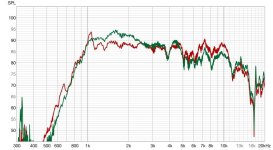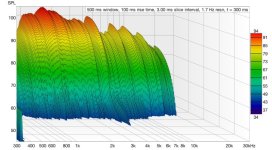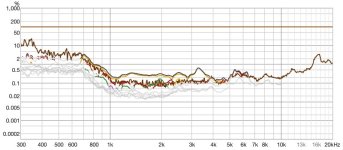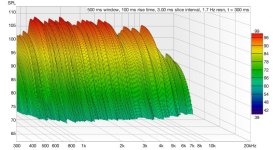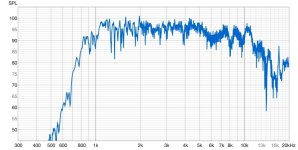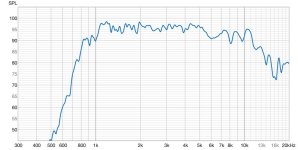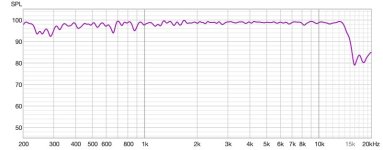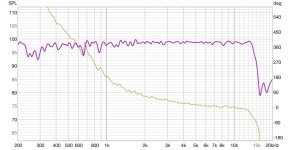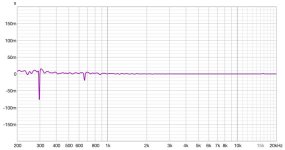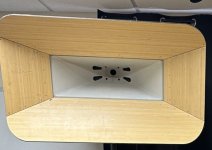Depth dimension looks very close to maximum, though Mr. Speakers just mentioned using the Eminence 314X, which is only .7mm less deep.I had a look on the B&C website and the specs look the same, though the physical dimensions are a little different, and the frequency response graph is different in the upper end because the 900 appears to have a spike around 16kHz vs the 920.
What do you think? Can I use DE900TN in place of DE920TN?
Other than the physical dimensions, looks OK.
We used the DE90TN originally. I think but am not sure it uses the same driver as the 900. it was pretty good but like all Ti compression drivers it had a bit of a hard edge Due to breakup modes that create the sharp HF peak characteristic of the class.Hi Art @weltersys
I'm about to order drivers for my Syntripps.
I planned to use 10CL51-8 and DE920TN-8. My local B&C supplier says that DE920TN is now end of life and unavailable, and suggests DE900TN as an alternative.
I had a look on the B&C website and the specs look the same, though the physical dimensions are a little different, and the frequency response graph is different in the upper end because the 900 appears to have a spike around 16kHz vs the 920.
What do you think? Can I use DE900TN in place of DE920TN?
DE920TN https://www.bcspeakers.com/en/products/hf-driver/archive/1.4/8/DE920TN
DE900TN https://www.bcspeakers.com/en/products/hf-driver/archive/1.4/8/DE900TN
Thank you.
The Eminence and Faital 1.4” drivers are an easy swap and both use the carbon Textreme domes. They are vastly superior in time domain, without any of the hard peaks titanium driver breakup modes create. The sound was shockingly better with the Eminence 314x drivers, no hardness at all. Both Faigal and Eminence have been measured by Voice Coil and they are just in a different league.
Here are Vance Dickason’s measurements:
https://audioxpress.com/article/test-bench-faital-pro-s-new-hf1460-pro-sound-compression-driver-1
https://audioxpress.com/article/test-bench-eminence-n314x-textreme-compression-driver
I literally consider these a game changer in top end clarity and smoothness. That said, for this reason they are also very hard to get. Parts Express has been out of stock on the 314x for months….
If anyone is interested in a source, I got mine from a dealer on EBay called speaker_addict who has some Eminence 314x they made by buying up 314 Ti drivers and swapping for the carbon dome (that is the exact same config as the 314x).
Last edited:
The DE920TN, DE900TN, and DE90TN each use different diaphragm designs, each with different response.We used the DE90TN originally. I think but am not sure it uses the same driver as the 900.
In testing using the Maltese horn I found the Eminence 314T to have less output below 1000Hz, and rougher response and less HF compared to a B&C DE82 (yet another type of 3" titanium diaphragm 🙄) the EV DH1A and CDX14-3050 .The Eminence and Faital 1.4” drivers are an easy swap and both use the carbon Textreme domes. They are vastly superior in time domain, without any of the hard peaks titanium driver breakup modes create. The sound was shockingly better with the Eminence 314x drivers, no hardness at all.
Eminence response charts show the 314T has smoother and more HF response than the 314x.
Do you have any records of how did the Eminence 314x low and high end compared to the DE90TN?
Art
@weltersys no, I didn’t archive scans…. In system though it definitely was smoother above 5k. The big win though is time domain where ringing is <1ms the waterfall is pretty awesome. The Faital is smoother still but is unobtainium…
These are near field measurements of the 314x in a Syntripp (ports have been sealed off). The raw driver is the green trace, the red shows post DIRAC EQ (I only ran processing to 10K for now).
EDIT: P.S. The DIRAC was also done far-field not near field hence it's got a few anomolies that did smooth with distance and having two speakers running, this had more to do with my cramped lab space and just running it for the first time vs a quality far field single driver scan.
Note the extremely uniform rolloff in the waterfall, there are no ringing modalities whatsoever. Also THD at 90dB is pretty much less than 0.5db and is noise-limited above 6Khz.
EDIT: It's kind of interesting how much smoother the raw is with the Syntripp than the Maltese! Another "well done" on the Syntripp as a platform!
EDIT: P.S. The DIRAC was also done far-field not near field hence it's got a few anomolies that did smooth with distance and having two speakers running, this had more to do with my cramped lab space and just running it for the first time vs a quality far field single driver scan.
Note the extremely uniform rolloff in the waterfall, there are no ringing modalities whatsoever. Also THD at 90dB is pretty much less than 0.5db and is noise-limited above 6Khz.
EDIT: It's kind of interesting how much smoother the raw is with the Syntripp than the Maltese! Another "well done" on the Syntripp as a platform!
Attachments
Last edited:
Large scale difference in the two graphs.EDIT: It's kind of interesting how much smoother the raw is with the Syntripp than the Maltese! Another "well done" on the Syntripp as a platform!
Your measurement of the 314x on your SynTripP varies +/- 14dB from 700-15kHz.
My measurement of the 314T on the Maltese horn varies only +/- 7dB from 700-15kHz, ~ twice as smooth, but not as smooth as the B&C DE82, EV DH1A or CDX14-3050.
Thanks for the measurements!
Art
Sure… my $’02 is DSP can fix frequency but not time domain and for me that is the priority, but noted and yes, silly o don’t check scale…
Obviously it’s important to pick the driver that’s igoing to work best for your system and goals…
Obviously it’s important to pick the driver that’s igoing to work best for your system and goals…
OK, I re-ran the measurements with a better mic at 2m instead of super near-field. Much better results. No EQ/DSP used.
This is superb pre-EQ. And the waterfall is down 50dB from signal with no sign of ringing.
This is superb pre-EQ. And the waterfall is down 50dB from signal with no sign of ringing.
Attachments
Corrected measurements show ~+/-6dB from 800-15KHz. We crossover around 900 with a 48dB crossover and this works great.Large scale difference in the two graphs.
Your measurement of the 314x on your SynTripP varies +/- 14dB from 700-15kHz.
My measurement of the 314T on the Maltese horn varies only +/- 7dB from 700-15kHz, ~ twice as smooth, but not as smooth as the B&C DE82, EV DH1A or CDX14-3050.
Thanks for the measurements!
Art
Interestingly, there is a split between those who prefer less HF ringing, and those who prefer more.Sure… my $’02 is DSP can fix frequency but not time domain and for me that is the priority, but noted and yes, silly o don’t check scale…
Obviously it’s important to pick the driver that’s igoing to work best for your system and goals…
As Bennett Prescott of B&C puts it, people like the ringing because it makes it seem like there is more high frequency, "this is the sound that everybody loves".
When they made the DE 880, with HF ringing about half that of the DE900TN, people liked it, but asked for something "more like the DE900TN".
Bennett Prescott of B&C and Matteo Bianchini of 18Sound:
Really good in depth discussion about compression drivers.
Art
Hi Art,
I'll check out the video thanks for sharing.
The headphone industry used to deal with a lot of ringing, but most vendors have worked hard to get rid of it; the consensus in the community is ringing in headphones is to be avoided. For this reason none of our headphones have any material ringing and as such I'm quite used to the clarity and resolution that imparts and is why the time domain here was so important to me....
As soon as we fired up the system with the n314x it was easily audible that there was much better detail retrieval and articulation in the highs, with a notably less edgy sound. Now as you note some may prefer that, but I do consider this a form of distortion and I'm really happy to have an option that meets my preferences.
Here's a waterfall of the 314x from Vance at Voice Coil... You can see it's ~25dB down by .5ms, incredibly fast. To me when I fired the system up it was such a reflief at high SPL to hear highs like I expect from our headphones... Again, some may prefer the ringing as you note, just like some people prefer MP3 to lossless for the same reason. There's probably not a "right" answer for everyone but for folk with preferences like mine this literally changed the sound of the tops in a big, enjoyable way. The Syntripps haven't sounded better!

Dan
I'll check out the video thanks for sharing.
The headphone industry used to deal with a lot of ringing, but most vendors have worked hard to get rid of it; the consensus in the community is ringing in headphones is to be avoided. For this reason none of our headphones have any material ringing and as such I'm quite used to the clarity and resolution that imparts and is why the time domain here was so important to me....
As soon as we fired up the system with the n314x it was easily audible that there was much better detail retrieval and articulation in the highs, with a notably less edgy sound. Now as you note some may prefer that, but I do consider this a form of distortion and I'm really happy to have an option that meets my preferences.
Here's a waterfall of the 314x from Vance at Voice Coil... You can see it's ~25dB down by .5ms, incredibly fast. To me when I fired the system up it was such a reflief at high SPL to hear highs like I expect from our headphones... Again, some may prefer the ringing as you note, just like some people prefer MP3 to lossless for the same reason. There's probably not a "right" answer for everyone but for folk with preferences like mine this literally changed the sound of the tops in a big, enjoyable way. The Syntripps haven't sounded better!
Dan
Last edited:
Arn't these guys bitter business enemies? 🙂Bennett Prescott of B&C and Matteo Bianchini of 18Sound:
//
B&C Speakers bought 18Sound and Ciare in 2017, and Eminence Speakers last September.
It's a (big) happy family...
It's a (big) happy family...
Super smooth!Here's system response with the DIRAC DSP on.
What does the phase plot come out like?
Their website says
"Mixed-phase sound optimization with patented algorithms to improve your sound experience."
Attachments
A couple of things for the curious.... One question was about phase, well another view of phase is to use Min phase calculation, shown below.

In addition, our system was really limited in peak output by having the tops crossing at 95Hz, the 10" drivers were just being over driven trying to keep up with the bass bins.
We added a 90-300Hz kicker from the High Order Quarterwave Society on Facebook, or HOQS. The Kicker we chose was the C3D design with a 12" driver. It's pretty compact and we place it on the bass bins where it anchors the riser for the tops. We modified the C3D cabinet with lots of extra bracing as they kind of went light on keeping box resonances under control. It's an interesting piece, the long resonator's exit aperture actually is 360deg around the short resonator, it's a box foating in a box.
With this in place system output increased about 8-10dB.

In addition, our system was really limited in peak output by having the tops crossing at 95Hz, the 10" drivers were just being over driven trying to keep up with the bass bins.
We added a 90-300Hz kicker from the High Order Quarterwave Society on Facebook, or HOQS. The Kicker we chose was the C3D design with a 12" driver. It's pretty compact and we place it on the bass bins where it anchors the riser for the tops. We modified the C3D cabinet with lots of extra bracing as they kind of went light on keeping box resonances under control. It's an interesting piece, the long resonator's exit aperture actually is 360deg around the short resonator, it's a box foating in a box.
With this in place system output increased about 8-10dB.
- Home
- Loudspeakers
- Multi-Way
- SynTripP: 2-way 2-part Virtual Single Point Source Horn
